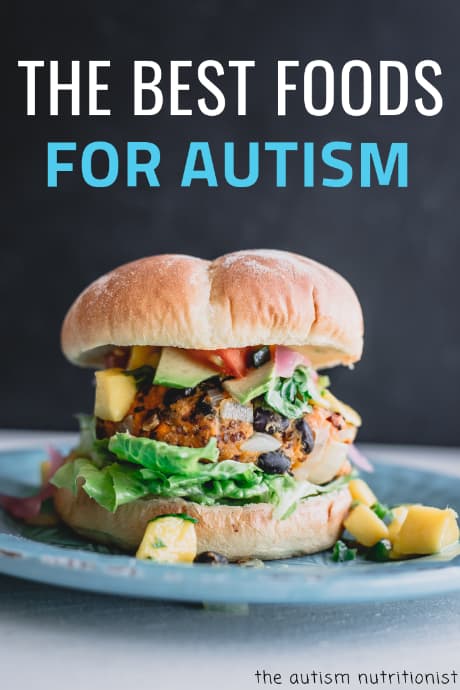
Despite the plethora of anecdotal success stories of alternative diets for autism, scientific research is unable to support many of the claims we hear.
That doesn’t mean diets like gluten-free and casein-free won’t help your child’s symptoms. What it does mean is that there is no guarantee these diets help. Every child has a different response to food just as every child’s autism experience is different.
Because of the uncertainty associated with special elimination diets for autism, I suggest looking to easier diet modifications to first.
Many are eager to remove foods from the diet, but few ask about foods that can be added. As kids on the spectrum tend to have limited diets, there is often AMPLE opportunity to bring in foods that can help them.
While there is no “best autism diet” at the moment, there are certainly foods that can help improve your child’s autism symptoms and overall health.
The best foods for children with autism:
Fatty fish and fortified eggs
These foods share the healthy omega 3 fatty acid. The American diet tends to be low in healthy fats and omega 3 in particular. Omega-3s fight inflammation. Low consumption of omega 3 fatty acids have been linked to autism, dyslexia, ADHD, depression, anxiety, and dyspraxia [1]. The consensus in omega 3 supplementation in those on the autism spectrum is inconclusive [2], but there is published and anecdotal evidence that it can improve ASD symptoms such as language and hyperactivity [3]. The good thing is that there is absolutely no harm to including more omega 3 foods in your child’s diet. The tricky part is that omega 3s are found primarily in fatty fish like salmon, herring, mackerel, and sardines. Luckily, it’s also in fortified eggs and more mild fish like cod and canned tuna. Try to serve free-range omega 3 eggs and fatty fish 3 days a week. Fish cakes or burgers, fish sticks, and tacos can be good starting points for young fish skeptics.
Buy wild fish if you can. Sustainably raised fish is not only better for the environment, but also has higher nutrient levels and less mercury than farm-raised.
Grass-fed beef and sustainably raised animal proteins
Guess what? Grass-fed beef also contains those healthy omega 3 fats! Grass-fed beef contains higher levels of healthy fats, more beneficial nutrients (like vitamins A and E), and fewer less beneficial ones (like cholesterol) than conventionally raised beef. Like free-range chicken and other organic animal proteins, grass-fed beef also contains fewer additives like hormone and antibiotics. These can make a difference for children with food sensitivities and health conditions like autism. Animal protein is beneficial for children with autism because of it is a source of B12. B12 plays an important role in the nervous system and some research suggests that supplementation with vitamin B12 can be helpful for kids on the spectrum [4]. Red meat also contains zinc which you’ll read about below.
Because conventional grocery stores don’t always carry grass-fed, sustainably raised, and/or organic meats (and if they do they’re often VERY pricey!), I recommend ButcherBox a service that delivers healthy, high-quality meat directly to your doorstep.
Check them out here. (Note, I am a ButcherBox affiliate and may receive commission from a purchase)
Shellfish, beans, nuts, seeds
Due potentially to limited diets, many children on the spectrum have low levels of zinc. Research also has found a relationship between autism and low zinc levels in infants [5]. Beyond its association with ASD, zinc is a nutrient that impacts taste. Improving low zinc levels can be a cure for picky eating. Incorporate zinc-containing foods such as shellfish, beef, fortified cereals, beans, peas, yogurt, cheese, cashews, pork, chickpeas, lentils, and almonds daily.
To recap
Some of the best foods for children with autism include beef, fatty fish, fortified eggs, nuts, seeds, and beans to your child. I recommend establishing a well-rounded nutritious diet before turning to elimination diets to help improve health and autism symptoms.
Homework
Pick three of the foods mentioned to add into meals for your child this week.
AND
My autism nutrition program is perfectly designed for picky kids who have trouble trying new foods.




Yes, thank-you it has great ideas, to share with parents. thank-you again.
My son is very picky with food he may eat mash potatoes one day and hate it the next day .. And his favorite is Spegetti and Roman huddles
Hi I’ve just found out my son has autism and his food diaryis shocking he won’t try nothing new and don’t want to start on the frozen foods as would like to try and make nice food for him if he ll try just need some ideas thanks
My four year old grandson is a very picky eater, few things he will eat oatmeal, eggs, tomatoes, macaroni and cheese, yogurt. I would like to get your picky eater guide, please?